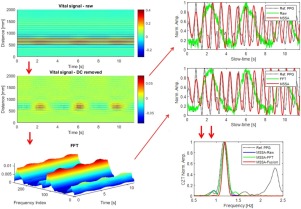Sensors and Actuators A: Physical ( IF 4.6 ) Pub Date : 2020-04-02 , DOI: 10.1016/j.sna.2020.111968 Minhhuy Le , Dang-Khanh Le , Jinyi Lee

|
Remote sensing of the heartbeat signal is an important task in a smart home and smart hospital. Ultra-wideband impulse (UWB) radar is recently noticed as a promising and potential solution for the task. In this paper, we propose a method based on multivariate singular spectral analysis (MSSA) for efficient extraction of heartbeat signal in the mixing with respiration and noise signals. The proposed method takes into account the correlation of the harmonic components of the multivariate input signals; and, thus, it provides a solution for the extraction of the heartbeat signal in an efficient way. Experiments were performed with different people, different orientations, and various distances from 0.5m to 3.0m. The experiment results showed that the proposed MSSA method could improve heartbeat signals with an average of 40dB signal-to-noise ratio (SNR). And, it outperformed the CWT and SSA methods with averages of 32dB and 18dB SNR, respectively. The accuracy of measurement of the heart rates by the proposed MSSA method was 3.44 % (0.044Hz) of standard deviation error compared with a reference photoplethysmography (PPG).
中文翻译:

多元奇异谱分析用于超宽带脉冲雷达遥感心跳提取
在智能家居和智能医院中,心跳信号的遥感是一项重要的任务。最近,超宽带脉冲(UWB)雷达被认为是一项有前途且有潜力的解决方案。在本文中,我们提出了一种基于多元奇异谱分析(MSSA)的方法,用于在呼吸和噪声信号混合中有效提取心跳信号。所提出的方法考虑了多元输入信号的谐波分量的相关性。因此,它提供了一种以有效方式提取心跳信号的解决方案。实验是针对不同的人,不同的方位以及从0.5m到3.0m的不同距离进行的。实验结果表明,提出的MSSA方法可以改善心跳信号,平均信噪比(SNR)为40dB。而且,其平均信噪比分别超过CWT和SSA方法,平均信噪比为32dB和18dB。与参考光体积描记法(PPG)相比,通过建议的MSSA方法测量心率的准确度为标准偏差的3.44%(0.044Hz)。



























 京公网安备 11010802027423号
京公网安备 11010802027423号